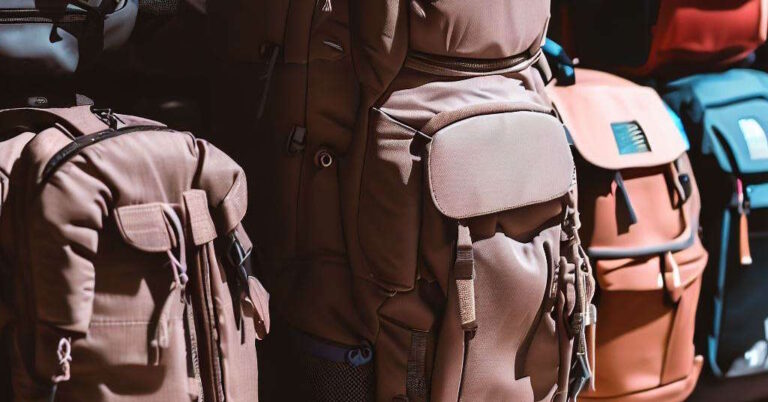The Best Hiking Backpacks for Comfort and Durability
Hiking is a popular outdoor activity that allows individuals to immerse themselves in nature while experiencing the thrill of exploring new trails and landscapes. Whether you’re a seasoned hiker or a beginner, having the right equipment is crucial for a successful and enjoyable hike. One essential item that every hiker needs is a reliable backpack. In this article, we will explore the best hiking backpacks for comfort and durability, taking into account various factors to help you make an informed decision.
Introduction
When embarking on a hiking adventure, it’s important to have a backpack that can withstand the rigors of the trail while providing optimal comfort. The best hiking backpacks combine durability, functionality, and ergonomic design to ensure that you can carry your essentials without feeling weighed down. Let’s delve into the factors you should consider when choosing a hiking backpack.
Factors to Consider When Choosing a Hiking Backpack
- Capacity and Size
The first consideration when selecting a hiking backpack is its capacity and size. The capacity determines how much gear and supplies you can carry. Smaller capacity backpacks are suitable for day hikes, while larger ones are designed for multi-day trips. Additionally, the size of the backpack should be proportionate to your body frame for a comfortable fit.
- Weight
Hiking involves traversing various terrains, and every extra ounce can make a difference. Lightweight backpacks reduce strain on your back and shoulders, allowing you to hike longer distances without discomfort. Look for backpacks made from lightweight materials without compromising durability.
- Comfort and Fit
A well-fitting backpack is essential for comfort during long hikes. Look for adjustable shoulder straps, hip belts, and sternum straps to distribute weight evenly across your body. The backpack should have padding in the right places and a suspension system to reduce pressure on your back.
- Durability
Durability is a key factor in ensuring your backpack can withstand the demands of hiking. Look for backpacks made from high-quality materials such as ripstop nylon or Cordura. Reinforced stitching and robust zippers add to the backpack’s durability, allowing it to endure rough conditions.
- Organizational Features
An organized backpack makes it easier to access your gear on the trail. Look for multiple compartments, pockets, and attachment points for securing your belongings. Features like a hydration sleeve, trekking pole attachments, and external gear loops can be beneficial depending on your hiking needs.
- Ventilation and Breathability
Hiking can make you work up a sweat, so it’s important to choose a backpack with good ventilation and breathability. Look for backpacks with mesh back panels and adjustable airflow systems that allow air to circulate, keeping you cool and reducing moisture build-up.
- Waterproofing
Weather conditions can change unexpectedly during a hike, so having a waterproof backpack is crucial for protecting your gear. Look for backpacks made from water-resistant materials or those that come with a rain cover to keep your belongings dry in wet conditions.
Now that we have discussed the factors to consider, let’s explore the top 5 hiking backpacks for comfort and durability.
Top 5 Hiking Backpacks for Comfort and Durability
| Backpack | Features | Pros | Cons |
|---|---|---|---|
| Osprey Atmos AG 65 | – Anti-Gravity suspension system – Adjustable harness – Integrated rain cover | – Excellent ventilation and comfort – Durable construction – Spacious and well-organized – Lifetime warranty | – Relatively heavier compared to some competitors |
| Deuter Aircontact Lite 65+10 | – Adjustable back length – VariQuick system for easy adjustments – Detachable daypack | – Great load transfer and stability – Aircontact ventilation system – Ample storage capacity | – Daypack attachment could be more secure |
| Gregory Baltoro 65 | – Response A3 suspension system – Customizable fit – Removable top lid doubles as a daypack | – Excellent organization and access – Comfortable and supportive suspension – Durable materials | – Heavier than some alternatives – Expensive |
| REI Co-op Flash 65 | – Lightweight design – Adjustable torso length – Hydration-compatible | – Affordable price – Good balance of comfort and weight – Adequate storage options | – Limited external attachment points – Not as durable as high-end models |
| The North Face Banchee 65 | – Opti-Fit suspension system – Dynamic aluminum frame – Multiple access points | – Comfortable and stable fit – Sturdy construction – Well-designed pockets and compartments | – Hip belt pockets are small – Not fully waterproof |
How to Choose the Right Hiking Backpack for Your Needs
With numerous options available, choosing the right hiking backpack can be overwhelming. Here are some tips to help you make the best choice:
- Assessing your requirements: Consider the duration of your hikes, the terrain you’ll be covering, and the gear you’ll need. This will help determine the appropriate capacity and features required for your backpack.
- Trying the backpack on: Visit a local outdoor store and try on different backpacks to assess their fit and comfort. Adjust the straps and walk around with the loaded backpack to get a feel for it.
- Researching customer reviews: Read reviews online to gather insights from other hikers who have used the backpacks you’re considering. Pay attention to feedback on comfort, durability, and overall performance.
- Considering your budget: Set a budget range based on your requirements. Remember that investing in a high-quality hiking backpack is a worthwhile long-term investment.
Conclusion
Choosing the best hiking backpack for comfort and durability is essential for a successful hiking experience. Consider factors such as capacity, weight, comfort, durability, organizational features, ventilation, and waterproofing. Research different backpack models and read customer reviews to make an informed decision. By selecting the right backpack, you can enjoy your hiking adventures while keeping your gear safe and your body comfortable.
FAQs
- Can I use a regular backpack for hiking?
- While it’s possible to use a regular backpack for short and easy hikes, they lack the specialized features and comfort of hiking backpacks. Hiking backpacks are designed to evenly distribute weight, provide ventilation, and offer additional features for outdoor activities.
- Are hiking backpacks waterproof?
- Not all hiking backpacks are fully waterproof. Some are made from water-resistant materials or come with rain covers to protect your gear during light rain showers. However, for heavy rain or submersion, it’s recommended to use dry bags or pack your items in waterproof liners.
- What is the ideal capacity for a hiking backpack?
- The ideal capacity depends on the length of your hikes and the gear you need to carry. Daypacks with capacities between 20 to 35 liters are suitable for day hikes, while multi-day backpacks typically range from 40 to 70 liters or more.
- How do I clean a hiking backpack?
- Follow the manufacturer’s instructions for cleaning your hiking backpack. In general, remove dirt and debris by brushing or wiping with a damp cloth. Use a mild detergent and a soft brush to scrub stubborn stains. Rinse thoroughly and air dry before storing.
- **Can I use a hiking backpack for other activities?**
- Yes, hiking backpacks are versatile and can be used for various outdoor activities such as camping, trekking, backpacking, and traveling. They offer features and durability that make them suitable for different adventures.







